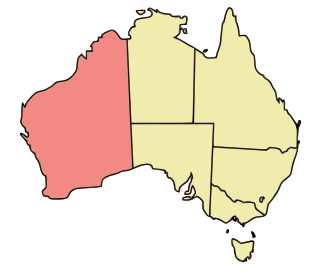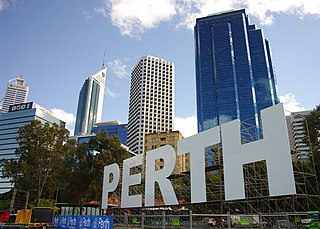Related Research Articles

The State Library of Western Australia is a research, education, reference and public lending library located in the Perth Cultural Centre in Perth, Western Australia. It is a portfolio agency of the Western Australia Department of Culture and the Arts, and facilitated by the Library Board of Western Australia.
The Peel region is one of the nine regions of Western Australia. It is located on the west coast of Western Australia, about 75 km (47 mi) south of the state capital, Perth. It consists of the City of Mandurah, and the Shires of Boddington, Murray, Serpentine-Jarrahdale and Waroona.
The Colonial Secretary of Western Australia was one of the most important and powerful public offices in Western Australia, in the time when Western Australia was a British colony. The Colonial Secretary was the representative of the British Colonial Office in Western Australia, and was usually appointed from Britain. He was responsible for all official correspondence between the colony and the Colonial Office. He was at all times a member of the Western Australian Legislative Council and the Western Australian Executive Council.

Western Australian Government Railways (WAGR) was the operator of railway services in the state of Western Australia between October 1890 and June 2003. Owned by the state government, it was renamed a number of times to reflect extra responsibility for tram and ferry operations that it assumed and later relinquished. Westrail was the trading name of WAGR from September 1975 until December 2000, when the WAGR's freight division and the Westrail name and logo were privatised. Its freight operations were privatised in December 2000 with the remaining passenger operations transferred to the Public Transport Authority in July 2003.

Crawley is a western suburb of Perth, the capital city of Western Australia. The area is part of the local government area of the City of Perth and was previously shared between the City of Subiaco and City of Perth. It is about 5.8 kilometres (4 mi) from the Perth CBD via Mounts Bay Road.

WAY 79, also referred to as WAY '79 and WAY 1979, was the official 1979 sesquicentennial celebration of the European colonisation of Western Australia.
The J S Battye Library is an arm of the State Library of Western Australia. It stores much of the state's historical records and original publications including books, newspapers, periodicals, maps, and ephemera, as well as oral history tapes, photographs and artworks, films and video, and non-government records which are kept in the library's Private Archives collection. The Library provides a range of services, including reference, copying, and genealogical services, as well as consultancy and reader education.

James Sykes Battye (1871–1954) was an Australian librarian who was the first chief librarian of the Victoria Public Library in Perth, Western Australia. He was a leading historian, librarian and public figure in Western Australian and also served as a Chancellor of the University of Western Australia.

The Alexander Library Building is located in the Cultural Centre of Perth, Western Australia.

The Goldfields Water Supply Scheme is a pipeline and dam project that delivers potable water from Mundaring Weir in Perth to communities in Western Australia's Eastern Goldfields, particularly Coolgardie and Kalgoorlie. The project was commissioned in 1896 and completed in 1903.

The East Perth Power Station is a disused power station in East Perth, Western Australia. For most of its life it was coal-fired, but ran on oil for six years. The site consists of a complex of industrial buildings occupying more than 8.5 hectares, bounded by East Parade, Summers Street, the Swan River and the Graham Farmer Freeway.
The Queensland State Archives is the lead agency for public recordkeeping in Queensland, Australia. It is the custodian of the largest and most significant documentary heritage collection about Queensland.

The Gold Stealing Detection Unit (GSDU), or Gold Stealing Detective Squad (GSDS), is a special unit of the Western Australian Police, based in Kalgoorlie, Western Australia. It investigates criminal activity and allegations at all stages of the gold production process in the state.
Meroula ("Mollie") Frances Fellowes Lukis was a prominent Western Australian archivist and promoter of women's rights.
Izzy Orloff (1891–1983), also known as Abraham Orloff, was a photographer in Fremantle, Western Australia.
The Kimberley Echo is a Kununurra, Western Australia based community newspaper.
The State Shipping Service of Western Australia was a state government transport entity formed in 1912, in Western Australia, primarily to service the ports of North West Australia.

The Esplanade Reserve in Perth, Western Australia was a heritage listed public space between Perth Water and the Perth central business district. It formed part of, and was occasionally referred to incorrectly as, the Perth foreshore and the Perth waterfront. The public space was resumed by the Western Australian state government in April 2012 as part of the Elizabeth Quay redevelopment of the Perth waterfront area.
Staff and prisoners of Fremantle Prison occupied the former prison on The Terrace, Fremantle, in Western Australia, between 1855 and 1991. Fremantle Prison was administered by a comptroller general, sheriff, or director, responsible for the entire convict or prison system, and a superintendent in charge of the prison itself. Prison officers, known as warders in the 19th century, guarded against escapes, enforced discipline, oversaw prisoner work, and instructed inmates in trades. Officers worked under stringent conditions until they achieved representation through the Western Australian Prison Officers Union. Convicts were initially of good character, as potential future colonists, but eventually less desirable convicts were sent, until the end of transportation in 1868. As a locally run prison, Fremantle's population was generally short-sentenced white prisoners in the 1890s, with very few Aboriginal prisoners; however, by the late 20th century, most prisoners were serving longer sentences, a higher proportion of them were violent, and Aboriginal people were over-represented.
The Department of Planning, Lands and Heritage is the department of the Government of Western Australia responsible for planning and managing all land use and heritage considerations within the state. The Department was formed on 28 April 2017 as a merger of the former departments of Planning, Lands Management, the Heritage Council and the heritage and land management functions of the former Department of Aboriginal Affairs.
References
- "Towards a State Archive in Western Australia, 1903–1945", by Michael Nind, published in Early Days (Vol. 11, Pt. 3) in 1997.
This article provides a concise account of the developments that led to the appointment of Mollie Lukis in 1945 as the State's first Archivist.
- "The Pre-history of the State Archives" : address by Sir Paul Hasluck
Transcript of an address given by Sir Paul Hasluck in March 1982 to the Friends of Battye Library. The original recording also available from the State Library's Oral History Collection (OH1091)
- "The State Archives of Western Australia" by Tom Reynolds and Christopher Coggin, published in Western Perspectives: Library and Information Services in Western Australia (edited by Robert C. Sharman and Laurel A. Clyde) in 1990.